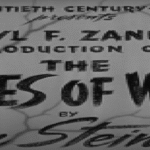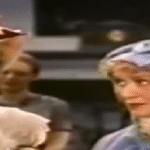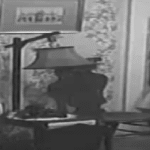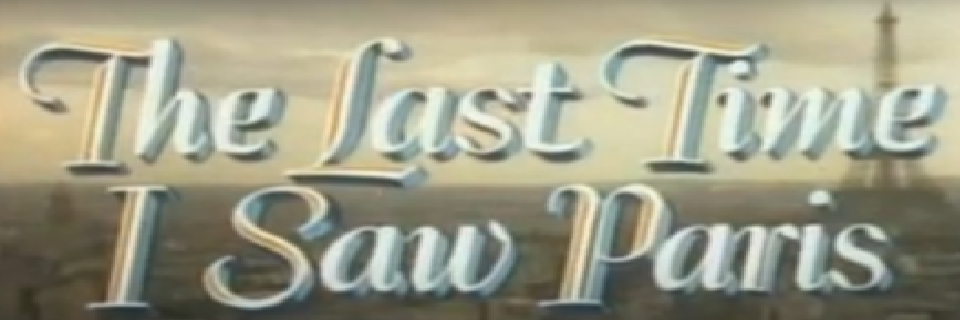The Last Time I Saw Paris is a romantic drama film directed by Richard Brooks and released by Metro-Goldwyn-Mayer in 1954. Loosely based on F. Scott Fitzgerald’s short story Babylon Revisited, the film stars Van Johnson, Elizabeth Taylor, Walter Pidgeon, Donna Reed and Eva Gabor. Set primarily in post-war Paris, the film is a story of love, loss, ambition and redemption, exploring the personal consequences of war and the pursuit of the American dream through the eyes of an expatriate writer.
The film begins in the present day with Charles Wills (played by Van Johnson), an American journalist, returning to Paris for the first time in many years. His arrival is solemn, and it quickly becomes clear that his visit is not for pleasure but to revisit painful memories of a life and love he once had. As Charles walks through the familiar streets of Paris, he reflects on the events that led him to this moment. The story unfolds in flashback, slowly revealing the highs and lows of his passionate yet ultimately tragic relationship with his late wife, Helen.
Shortly after the end of World War II, Charles had arrived in Paris as a correspondent, covering the post-war reconstruction efforts. It is during the city’s vibrant post-war celebrations that he first meets Helen Ellswirth (Elizabeth Taylor), a beautiful and spirited young woman from a once-wealthy American family living in Paris. Her father, James Ellswirth (Walter Pidgeon), is a charming yet irresponsible bon vivant who lives far beyond his means and spends his days reminiscing about past glory rather than confronting reality. Helen’s younger sister Marion (Donna Reed) is far more practical and reserved. She quietly harbours feelings for Charles but hides them as she sees him fall quickly under Helen’s spell.
Helen and Charles’s romance blossoms swiftly amidst the romantic backdrop of Paris, and they marry despite the lack of financial security. Charles dreams of becoming a serious novelist but struggles to make ends meet. Initially content, Helen supports his ambitions, believing in his talent. The couple welcome a daughter, Vicki, who becomes a symbol of their love and shared hope for the future. However, as time passes and Charles continues to face rejection from publishers, the pressure mounts. Frustrated by his lack of success and embittered by the sacrifices he must make, Charles returns to journalism to provide for his family. This decision gradually erodes his sense of purpose and creative spirit.
The couple’s lifestyle begins to reflect the disillusionment beneath their romantic veneer. They attend glamorous parties, drink heavily and socialise with the Parisian elite, including a wealthy and flirtatious Hungarian named Maurice (played by George Dolenz). The dazzling social scene masks the growing emotional distance between Charles and Helen. Charles becomes increasingly consumed by jealousy and resentment, while Helen, once vibrant and hopeful, becomes emotionally worn. Their marriage deteriorates as alcohol and unspoken regrets take their toll.
Marion remains a quiet presence throughout these years. Despite her own heartbreak, she provides a stable influence for Vicki and tries to keep the family from falling apart. However, the cracks become too deep to repair. Helen begins to drift emotionally and eventually seeks solace outside the marriage. When Charles discovers her infidelity, it marks a final rupture in their already fractured relationship.
Tragedy strikes when Helen falls gravely ill after a night of aimless wandering in the rain. By the time Charles realises the depth of her despair and tries to reach out, it is too late. Helen dies, leaving Charles devastated and consumed with guilt over the years they lost to bitterness and regret. The death of Helen is a turning point for Charles, forcing him to confront the consequences of his own failures and the impact they have had on those he loved.
Following Helen’s death, Charles spirals further into grief. His relationship with his daughter Vicki becomes strained, and he struggles to provide a stable environment for her. Recognising this, Marion steps in to care for the child. Eventually, she seeks custody, believing that Charles’s emotional state is too unstable to raise Vicki properly. A custody battle ensues, and though Charles initially fights to retain custody, he comes to realise that Vicki’s wellbeing must come before his pride. He relinquishes his claim and leaves Paris, effectively walking away from both the city and the painful memories it holds.
Years later, as the film returns to the present, Charles is seen as a changed man. He has matured, gained clarity and finally found success as a writer. His return to Paris is prompted by a deep desire to reconnect with his daughter and to make amends for the past. He reaches out to Marion, who is now caring for Vicki. Initially reluctant, Marion eventually agrees to facilitate a meeting. The film ends on a note of hope as father and daughter prepare to reunite, suggesting that while the past cannot be undone, healing and redemption are still possible.
The Last Time I Saw Paris is more than just a romantic tragedy. It is a commentary on post-war disillusionment, the fragility of dreams and the cost of ambition when it comes at the expense of personal happiness. The film portrays the allure and dangers of Parisian glamour, the intoxication of idealised love and the eventual reckoning with reality that all people must face. Elizabeth Taylor’s performance as Helen is particularly poignant, capturing the complexity of a woman who is both muse and victim, vibrant yet ultimately broken by circumstances and choices.
Van Johnson delivers a nuanced portrayal of Charles, a man whose good intentions and creative ambition are slowly worn down by life’s disappointments. His journey is one of introspection, failure and, finally, redemption. The film also benefits from a lush musical score and rich cinematography, which vividly bring post-war Paris to life and heighten the emotional impact of the story.
Though adapted loosely from Fitzgerald’s short story, the film deviates significantly in tone and narrative direction. Where Fitzgerald’s Babylon Revisited is a somber reflection on personal failure set against the background of economic collapse, The Last Time I Saw Paris leans more heavily into romantic melodrama. However, both works share a core theme: the haunting nature of the past and the human desire for second chances.
In the end, The Last Time I Saw Paris remains a memorable film for its emotional depth, evocative setting and exploration of timeless themes. It serves as a reminder that love, however fleeting, leaves a lasting mark and that the journey toward self-forgiveness is often the most difficult one of all.







